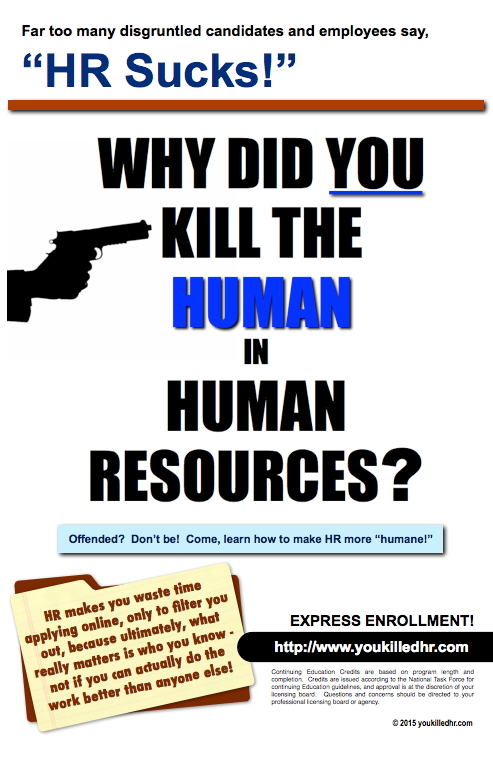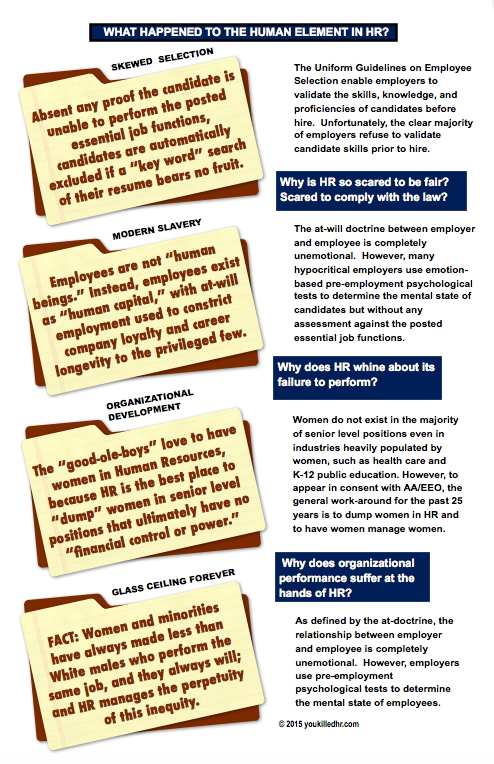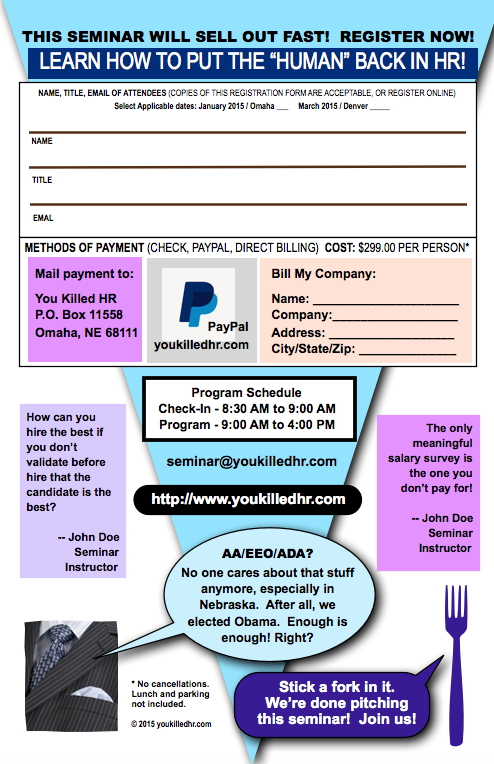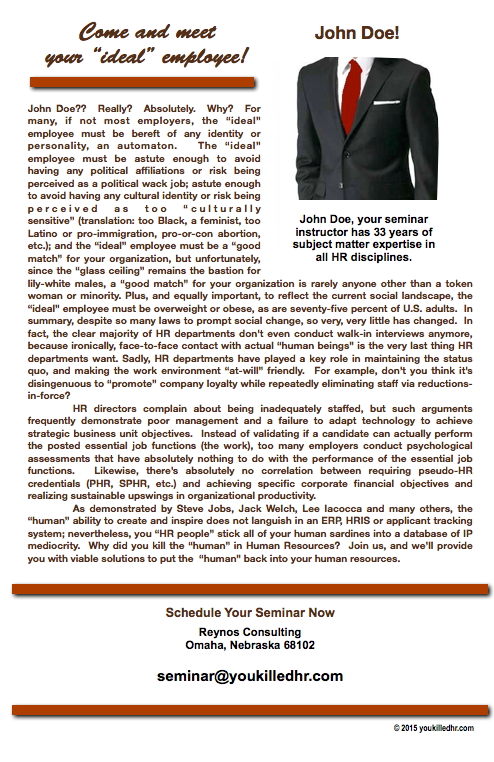Whatever happened to actually meeting with and talking to candidates? |
|
Instead, the standard practice for many employers is to
use online applicant processing and tracking systems and "keyword" searches to filter out candidates, but without first validating whether or not the candidate can perform the actual essential job functions at a standard level of performance that reconciles with current work performed by actual employees. The "bait and switch" recruitment process is great for third-party HR consultants and behavioral psychologists - who have absolutely no hands-on expertise actually conducting robust recruitment and selection campaigns of increasing complex positions - but this practice fails to consistently deliver candidate who can consistently perform the essential job functions at or above standard. The absolute BEST way to evaluate a candidate's skills is against the actaul essential job functions and job standards. Most importantly, there’s absolutely no such thing as overqualified or under qualified; these terms are historically used to intentionally discriminate against women, minorities, disabled, and persons over 40 years of age. For example, consider the case of a 38 year old White woman who seeks to return to work after being a stay-at-home mom for two years. If this unemployed single-White-female with 20 years of accounting management experience (who also holds a CPA designation) seeks re-employment in a non-management level Accountant I position (because she needs immediate and stable WORK to feed her family), there are ONLY three considerations: |
 |
| PAGE 2 | |
1. FAILURE TO PERFORM - If she (the employee) fails to perform the essential job functions at the pre-established job standards, she would be terminated for "failure to perform." Consistent with case law, the so-called emotional state of the employee is not relevant, because the employee's only purpose for being at the employer's at-will work site is to work - period. Consistent with case law, the employee is not required to "like" the employer, nor is the employer required to "like" the employee. As clearly defined by the at-will employment doctrine where either party can terminate the "non-agreement" at any time, with or without reason or notice, it's not a "relationship," it's work. 2. INSUBORDINATION - If she (the employee) unilaterally decides to perform unauthorized work that is beyond the character and scope of the essential job functions for the Accountant I position, she would be terminated for "insubordination." Consistent with case law, the so-called emotional state of the employee is not relevant, because the employee's only purpose for being at the employer's at-will work site is to work - period. The employer defines the essential job functions to be performed and the value of its job in the marketplace – not the employee. So, although the candidate/employee clearly has job knowledge and proficiencies beyond the scope of the Accountant I position - she's NOT going to use this knowledge because the employer did NOT hire to use it, and the employer is NOT paying her to use it! Again, there's no such thing as under/over-qualified. Like everything else in life, you pay for ONLY what you want, and you get ONLY what you pay for. 3. STANDARD - She (the employee) performs the authorized essential job functions in compliance with the job standards established for the Accountant I position; and the employee's performance will be evaluated in a meritocracy-based system to determine periodic or scheduled salary adjustments. Unfortunately, the recruitment and selection process is typically skewed against women who choose to opt-out of the workforce to start families. The non-work-related "emotional behavior" of the potential employee is questioned via personality preference and behavioral tests that attempt to project what a potential employee thinks, wants or needs; or what an potential employee has or will do; none of which validates if the potential employee can consistently demonstrate and deliver the required proficiencies to actually "perform" the essential job functions. |
 |
| PAGE 3 | |
The "bait and switch" recruitment process is great for generating revenue streams for third-party HR consultants and behavioral psychologists, but such practices are potentially litigious because at no point is the actual proficiency of the candidate linearly assessed against the actual essential job functions. Conversely, pre-employment physicals for drug screening [to determine illegal drug use and eligibilty for health benefits (i.e., the screen-out cigaratte smokers] and physical aptitude [i.e., to determine if a bus driver can manually and consistently pull 12.5 pounds of force to open a school bus door) is appropriate. However, pseudo-science to assess the "emotional well-being" of candidates in an "at-will" work environment is, at best, problematic because: (1) the immediate hiring authorities are not subject matter experts in behavioral science or physiological science; and (2) there is no empirical, fact-based evidence of any direct correlation between the design and execution of each essential job function versus the design and efficacy of the assessment tool used to make such assessments. Unfortunately, many employers want employees to actually "care" about the employer's well-being, which is ridiculous in an at-will work environment. Asking employees if they are "emotionally" involved in the employer's well being while the employer is concurrently planning and executing reductions-in-force (layoffs) is seen by most employees as hypocrisy and disingenuous, which is again, at best, problematic. The problem? Employers want candidates and employees to "feel" committed to their organizations while concurrently telling candidates and employees: (1) don't walk-in, don't show-up uninvited, don't call us, we'll call you - maybe; (2) that job security in our "at-will" environment is non-existent; and (3) you "worker-bees" are a dime-a-dozen, which is why we only give top consideration to the highest-compensated ("Top 1%") of our workforce/owners. Employers can change this extremely negative dynamic by treating candidates and employees humanely, by conducting recruitment and selection campaigns that actually identify, validate, and reward expertise and merit. The Solution? The solution provided by this seminar is how to use technology to: (1) more accurately identify and validate the work-related proficiencies of candidates and employees; and (2) to put "humanity" back into an industry, back into a profession that should be about people. |
 |
| PAGE 4 | |
| To schedule a seminar, please click here. |  |
The solution provided by this seminar is how to use technology to: (1) more accurately identify and validate the
work-related proficiencies of candidates and employees; and (2) to put "humanity" back into an industry,
back into a profession that should be about people.
To schedule a seminar, please click here.